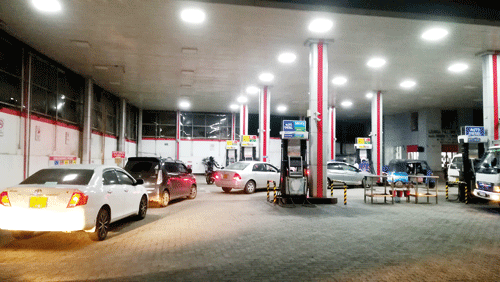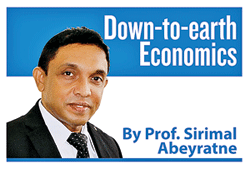Ending the fuel shortage in 12 months?
View(s):
File picture of fuel queue
The following is an extract from a Twitter message of the Energy Minister, Kanchana Wijesekera on July 25: “…Due to foreign exchange issues, fuel imports have to be restricted in the next 12 months. CPC (Ceylon Petroleum Corporation) has never distributed fuel daily to every single fuel station. Practically (it’s) not possible, even when stocks are unlimited.”
The message has attracted many responses from Twitter subscribers and it’s not my intention to further contribute to it; rather I am going to elaborate the underlying economics of the message and Sri Lanka’s economic management or, rather the mismanagement issue.
Even though, the message gives a definite time-duration of 12 months for import restrictions, it does not reveal whether the fuel shortage is going to be over by the end of 12 months; neither does it say whether there is any plan to solve the problem within 12 months.
New market players
The only hope we have is the Ministry’s request that was announced this week calling for expression of interest (EOI) from international fuel companies to supply and distribute fuel in the country. I hope that it will bring about a breakthrough in order to improve the domestic fuel market competition and to eliminate the fuel shortage in the country.
However, I have my own reservations too. The first is whether this opportunity would be hijacked by some players guided by the power struggle and the geopolitical interests in the region. In support of the same, my second issue of reservation is the deteriorated economic and political bargaining power of Sri Lanka under which the country is compelled to bow down to such geopolitical interests which would overrule the country’s economic interests.
The third issue is how far any potential player entering the domestic fuel market is willing to buy fuel for dollars and sell for rupees, without a requirement to convert the rupee income to dollars. Well, it’s not an impossibility if there is a promising business environment with a stronger domestic currency. However, even after 40 years, we are yet to see a strengthened rupee with a stronger trade export performance!
It was about a week ago when one of my Indian friends – Ramaraju Venuthurupalli, a former Professor from the Delhi University – was asking me through text messages about Sri Lanka’s fuel crisis. At one point he said that India buys crude oil from Russia at 50 per cent less than the OPEC price, refines in India, and sells to European countries at an international price to earn more foreign exchange; that’s wisdom in economic management taking advantage of trade turbulences between Russia and Europe!
Rationality in Economics
The Minister’s Twitter message reveals that the CPC has never distributed fuel to every single fuel station, which is practically impossible even if fuel is available; in other words, this means that demand for fuel is now greater than it used to be during the time when there was no fuel shortage.
 Probably, the point is true because now there are unending vehicle queues for fuel all around the country. When a fuel bowser with 6600 litres of fuel arrives at a fuel station and unloads it, within less than a day the whole stock is sold; but the vehicle queue for fuel continues to remain with more vehicles joining it.
Probably, the point is true because now there are unending vehicle queues for fuel all around the country. When a fuel bowser with 6600 litres of fuel arrives at a fuel station and unloads it, within less than a day the whole stock is sold; but the vehicle queue for fuel continues to remain with more vehicles joining it.
This implies that even if fuel is available, there will be continuing fuel queues in the months to come. Why? The key issue here is something fundamental to “economic behaviour” of human beings – rationality in economics! The subject of economics is built upon the concept called “rational economic man”.
The rational economic man makes decisions based on rational analysis of desired outcomes and acts in his own rational self-interest. When everyone is operating with “self-interest” which is not necessarily a bad thing under competitive market conditions, everyone’s economic needs are satisfied! If the market is not competitive, it is the responsibility of the government to make it competitive!
Keep the “full-tank”
The economic man’s rational decisions are based on the information flows and his ability to process them; accordingly, he would make decisions! What is the information flow that fuel consumers receive? Sri Lanka does not have enough dollars to buy fuel and thus the fuel supply is uncertain; the country has already defaulted its foreign debt payment due to unavailability of dollars.
As a result of “uncertainty” in fuel supply, every vehicle user is trying to keep the “tank full” which they didn’t do before. Some have started hoarding fuel to prepare for uncertainty, while others do the same for selling in the “black market”. It may be cheaper for some customers to buy “black market” fuel at 4 – 6 times the higher price than their opportunity cost of staying 2 – 3 days in a fuel queue to get the rationed amount of fuel.
They all work on self-interest (to maximise their own “utility” as it is explained in economics), but the problem is the “uncompetitive market” with supply shortages, created by economic mismanagement. Apart from all that, there are plenty of chaotic and unpleasant situations reported in fuel stations, when they attempt to work on self-interests in unregulated environments.
As per the “rational behaviour” of fuel consumers, the demand for fuel is now greater than what it was before. All sort of regulations, including QR systems and rationing, are experiments by the authorities to keep it more regulated, but the only way to solve the issue is to eliminate the shortage and improve the competition; we are yet far from it.
Exports for fuel and
fuel for exports
The question in issue is how to end the fuel shortage in the domestic market. And, to my understanding it is also the fundamental question that we have not thought of. There is no way other than earning foreign exchange, required for imports of fuel and other necessities!
More players in the market are good for ending the current “duopoly” and improving fuel supply on competitive basis. But still we need to have a foreign exchange supply in order to facilitate fuel imports by any market player. Fuel imports being restricted for the next 12 months means that there is no hope of improving the country’s foreign exchange earnings within the next 12 months; there is little evidence to expect that fuel supply will be normalised even after that.
As I have argued repeatedly in this column, Sri Lanka’s current economic crisis is a foreign exchange crisis, which has been formed by weak export performance. Sri Lanka needs to generate exports in order to import fuel as well as to get out of the crisis.
And, in turn Sri Lanka needs fuel even to sustain current levels of exports and keep the economy chugging along because fuel is an essential input to export production. Restrictions on fuel supply within the next 12 months means that the country is effectively constraining export growth which generates foreign exchange needed for the next shipment of fuel as well.
Earning foreign exchange
An increase in foreign exchange earning is not an “overnight” transition as it requires investment promotion; and investment promotion requires an enabling business environment that could attract investment. Export promotion has been repeatedly overlooked by all successive governments, particularly after 1995, for more than 25 years now.
What we have seen is only a launch of the National Export Strategy (NES) as late as in 2018; it aimed at raising Sri Lanka’s export earnings to US$28 billion by 2022. It’s not surprising in the Sri Lankan context that the NES never took off the ground for implementation.
As the country’s export earnings were about $12.5 billion in 2021, it is highly unlikely that the export earnings of Sri Lanka this year 2022 would be even half of what was planned by the NES. Under the given circumstances, how do we anticipate a breakthrough in 12 months, unless and until we take necessary steps to earn foreign exchange?
(The writer is a Professor of Economics at the University of Colombo and can be reached at sirimal@econ.cmb.ac.lk and follow on Twitter
@SirimalAshoka).
Hitad.lk has you covered with quality used or brand new cars for sale that are budget friendly yet reliable! Now is the time to sell your old ride for something more attractive to today's modern automotive market demands. Browse through our selection of affordable options now on Hitad.lk before deciding on what will work best for you!


